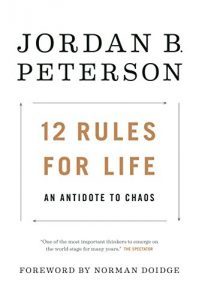Book Review: 12 Rules for Life: An Antidote to Chaos
 I first heard of Professor Jordan B. Peterson the way many people have: I watched Cathy Newman’s disastrous interview where she deliberately misrepresented every one of his responses, requiring him to correct her time and time again with a level of patience and humor one rarely sees in such hostile circumstances. Then I saw some highlight reels of his lectures. Then people I liked and respected started to say good things about him. So I picked up Peterson’s book 12 Rules for Life: An Antidote to Chaos and began reading.
I first heard of Professor Jordan B. Peterson the way many people have: I watched Cathy Newman’s disastrous interview where she deliberately misrepresented every one of his responses, requiring him to correct her time and time again with a level of patience and humor one rarely sees in such hostile circumstances. Then I saw some highlight reels of his lectures. Then people I liked and respected started to say good things about him. So I picked up Peterson’s book 12 Rules for Life: An Antidote to Chaos and began reading.
It is, without doubt, the most frustrating book I’ve ever read.
Frustrating because I find myself wishing this book had come to me twenty years ago. Twenty-five years ago. But back then my head was so firmly wedged up my rear end that I would’ve scoffed at the book as unable to teach the brilliant me anything I didn’t know. So I’ve had to content myself with the acknowledgment that I’ve read the book today, in my middle years, and that it still taught me a great deal about myself, why I do what I do, and most importantly, how to change what I don’t like about myself. I wish I’d read it sooner.
Criticisms of the book include claims that Peterson’s maxims like Pursue what is meaningful (not what is expedient) and Do not let your children do anything that makes you dislike them are too simple, that all you need to do is look at the chapter headings and you’ve gotten as much as you need from the text. These criticisms miss the forest for the trees. Drawing on his clinical experience, his research, his life experience, and texts like Paradise Lost and The Brothers Karamazov (among many others), he supports these maxims with thoughtful foundations that not only lead you to wisdom, but show you a path to seek out further learning.
He acknowledges suffering in a deeply personal way, describing what he and his family have gone through, not to mention his patients. But he also shows a way past it, a way to overcome suffering through tiny victories that lead to larger ones. It’s this acknowledgment, this explanation that no matter what you’re suffering you’re not truly alone in the mass of anguished humanity, that really shines. He addresses lying to oneself and lying to others as a terrible, soul-destroying poison in Rule 8: Tell the truth – or, at least, don’t lie; the seething anger of mass murderers (and those who idolize them) in Rule 6: Set your house in perfect order before you criticize the world; toxic relationships in Rule 3: Make friends with people who want the best for you; and many other subjects.
As a long-time student of the interpretation of body language, I found this statement of his fascinating: “Much of what we consider healthy mental function is the result of our ability to use the reactions of others to keep our complex selves functional. We outsource the problem of our sanity.”
This one was another favorite (over a thousand other people also found it meaningful): “It is far better to render Beings in your care competent than to protect them.” Excellent advice, particularly for parents. (There’s a reason why the term Being is capitalized. Read the book to find out.)
After I read the book, I looked back at the Cathy Newman interview and found that Peterson indeed practices what he preaches. The most remarkable moment in the interview is at 22:11, when Newman asks the patently ludicrous question, “Why should your right to freedom of speech trump a trans person’s right not to be offended?” Peterson’s answer is both pointed and poignant when he says, “Look at the conversation we’re having right now. You’re certainly willing to risk offending me in the pursuit of truth. Why should you have the right to do that? It’s been rather uncomfortable.” That simple honesty, that acknowledgment of discomfort, is something you almost never see in an interview. And Newman literally had no answer to it.
Improvement demands discomfort. Even pain. But you don’t have to bull your way through it alone. That’s where 12 Rules for Life comes in. You don’t have to agree with all of it, but you will come out the other end a lot smarter and wiser than you did before you cracked the book. How often can you say that about anything you read?










